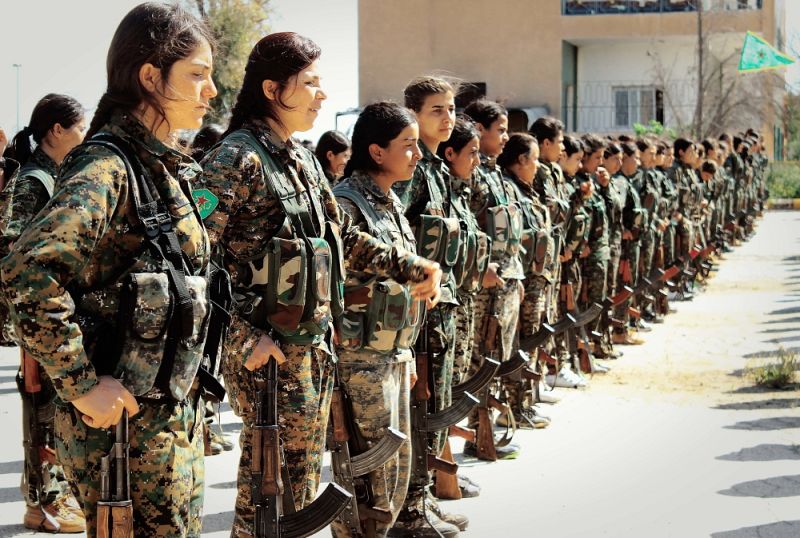It hasn’t all just been trash talking. U.S. President Donald Trump’s tenure in office has seen myriad policy blunders, missteps and disasters.
He has ordered the separation and detention of refugees at the southern border, eviscerated America’s environmental protections and cut taxes for the rich at a time of historic economic inequality.
His latest decision – without any real consultation – to withdraw roughly 150 American troops from north-east Syria might just rank as one of the worst. As predicted, the move has removed the only roadblock standing in Turkey’s way to invade Syria under the pretence of creating a "safe zone" in the region. In reality, their motivation has been to wage a war against the Kurdish people, an ethnic group Turkish President Tayyip Erdogan has labelled "terrorists".
So far, Turkey’s intervention has resulted in the displacement of over 130,000 people, over 700 relatives of IS fighters have fled from Kurdish-controlled camps and approximately hundreds of civilians have died. This has forced the Kurdish military – known as the Syrian Democratic Forces (SDF) – to enter into an agreement with the Assad Syrian Government, overseen by Russia. As part of the agreement, the Kurds will forfeit territory, including Manbij and Kobane.
SDF Chief, Mazloum Abdi, wrote in Foreign Policy Magazine that:
'If we have to choose between compromises and the genocide of our people, we will surely choose life for our people.'
But this step wouldn’t have been required, if not for Trump’s irresponsible, rash, ill-informed decision to withdraw American troops. In his all too familiar style, Trump defended himself on Twitter, saying ‘it is time for us to get out of these ridiculous Endless Wars’.
While the President may want to extricate America from the Middle East, his withdrawal has sparked more conflict. The U.S. troops stationed in north-east Syria were not there in an aggressive capacity, as they have so frequently been in the past. They were in place to deter Turkish invasion — that had so far proven successful. The removal of troops paved the way for Turkey to enter Syria, which was anticipated, and which they did, endangering the lives of the Kurdish people in Syria and the stability of the already-fragile region.
The move was a complete betrayal of its Kurdish allies. For the past several years, Kurdish militias led the fight on the ground, in areas such as Raqqa, Kobane and Baghouz, against IS. It came at a high cost to their own people, with the Kurds suffering over 11,000 casualties. They were instrumental in pushing back and eventually suppressing IS, an objective of much value to the U.S. and the West more generally. It made the region more secure and reduced the threat posed to the West by IS’s barbaric ideology.
This achievement, nothing short of heroism, has indebted America to the Kurds. Rather than repaying them, Trump has deserted them.
The pain of this abandonment is compounded by the contemporary plight of the Kurds. They are a people besieged by adversaries, which seek to deny Kurdish autonomy and independence. In the late 1980s and early 1990s, then Iraqi dictator Saddam Hussein terrorised the Kurdish population with chemical weapons and toxic gases, killing thousands.
They have battled Turkey for their freedom since 1978, while fending off the Assad Government amidst the Syrian Civil War.
Then, of course, the Kurds were a main opponent of IS, which infamously tried to establish a caliphate in the Middle East region. Surely, this history of intense and morally unjustifiable oppression must strengthen their claim to protection.
Most of all, the cultural and ethical values of the Kurdish people must be protected at all costs. In a region often marred by regressive values, such as those practiced by Saudi Arabia, IS and Iran, the Kurds are a shining example of progress. They are fierce advocates of women’s rights and even had their own exclusively female militias fight IS. They believe in secularism, a tenet of their Government in Rojava – now seriously imperilled. And the Kurds have remarkable respect for human rights, such as freedom of expression and religious non-discrimination.
While they have not built the perfect society – indeed, nobody has – the Kurdish people’s devotion to a culture of harmony, of goodness, means the global community must take urgent and comprehensive measures to ensure their prosperity.
The future is difficult to predict. The events of Turkey’s invasion have moved quickly, causing new, unforeseen developments, like that agreement forged between the Kurds and Syria. Maybe Trump’s newly-announced economic sanctions against Turkey will work. We don’t know yet. But what we do know is that the U.S. withdrawal has needlessly put the very survival of the Kurds in north-east Syria at risk, a virtuous people already surrounded by malicious enemies.
Nicholas Bugeja is an Assistant Editor for Independent Australia.
 This work is licensed under a Creative Commons Attribution-NonCommercial-NoDerivs 3.0 Australia License
This work is licensed under a Creative Commons Attribution-NonCommercial-NoDerivs 3.0 Australia License
Support independent journalism Subscribe to IA.












